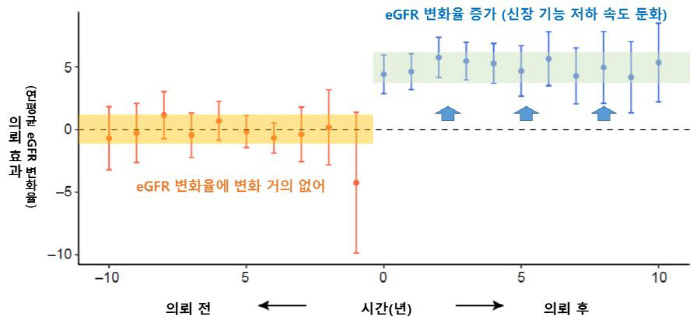Diabetes Stabilizes Kidney Function After Nephrology Treatment
Apr 03, 2025
|
Recent studies have shown that when diabetics are referred to nephrology and treated together with nephrology, renal function decreases more slowly than those who do not, and is effective regardless of the patient's renal function or timing of referral. If diabetics receive renal medicine treatment at an appropriate time, they can slow the development or progression of diabetic kidney disease.
A research team led by Professor Han Seung-seok and Professor Yoon Dong-hwan of the Department of Nephrology at Seoul National University Hospital followed up with 30,000 patients with type 2 diabetes and analyzed the effect of nephrologist treatment on the prognosis of renal function in diabetics on the 3rd.
Diabetic kidney disease is the most common kidney disease with a poor prognosis, and more than half of patients with terminal kidney disease who need dialysis come from the disease. With the recent increase in the number of diabetic patients, the prevalence of diabetic kidney disease continues to increase.
Although the kidney function (glomerular filtration rate, eGFR) of diabetic patients is recommended to receive nephrologist treatment when they are less than 60 and less than 30 in the United States and the Korean Diabetes Association, the actual effectiveness of nephrologist treatment has not been clearly analyzed.
The research team followed about 30,000 patients with type 2 diabetes who had no history of kidney disease who visited Seoul National University Hospital from 2004 to 2023 for up to 15 years. Afterwards, the rate of decrease in kidney function (annual eGFR change rate) before and after referral of the referral group (3885 people) compared to the non-requested group was analyzed using the Difference-in-Difference model. The average eGFR at the time of referral was 55.
As a result of the analysis, there was little change in the annual rate of decrease in eGFR before nephrology treatment and steadily decreased, but the effect on the annual rate of change in eGFR changed to amniotic fluid and the rate of decrease in renal function decreased immediately after nephrology treatment. It was found that the degree of eGFR reduction decreased by more than 5 every year after receiving renal internal medicine treatment.
In addition, renal internal medicine referrals slowed the rate of decline in renal function regardless of the risk of deterioration of renal disease (low risk, intermediate risk, high risk) or the timing of referrals (early and late). In particular, in patients with a very high risk of deteriorating renal function, the annual eGFR preservation effect was 10.
The nephrological referral group increased the use of uric acid treatment and artificial resection as well as diabetes drugs (SGLT2 inhibitors) and hypertension drugs (RAS blockers) that are effective in preserving renal function. On the other hand, prescriptions of nonsteroidal anti-inflammatory drugs (NSAIDs), which may adversely affect renal function, and fibrate, which affect eGFR levels, decreased. Some of the referral groups performed kidney biopsy, and nearly half of the patients were diagnosed with kidney disease other than diabetic kidney disease, so appropriate treatment directions could be established.
The research team explained that if the patient's eGFR 40 is assumed to be reduced by 7 per year, it will reach a level that requires dialysis (around eGFR 10) within 4 to 5 years. If a nephrologist is treated, the rate of reduction of eGFR can be reduced to about 2 per year and the timing of dialysis can be delayed by more than 10 years.
Professor Seung-Seok Han said, "The renal specialist was able to comprehensively review drugs affecting the kidneys and adjust or discontinue the dose depending on the patient's condition, even if they were effective. It is also possible to restore some renal function by checking for other kidney diseases in some patients and diagnosing glomerulonephritis, especially those requiring immunosuppressants. In some diabetic patients, if acute renal injury is present together, the cause may be identified and kidney function may be restored.'
"This study is significant by examining the kidney protection effect of nephrologist treatment in diabetics with eGFR of 30 or 60 or more," he said. "Even diabetics with eGFR of 30 or more need nephrologist treatment from an early stage depending on their condition, and an appropriate renal consultation request would be an important 'negotiation skill' for doctors, that is, 'treatment skill'."
On the other hand, the findings of this study were published in the recent issue of the `Kidney Research and Clinical Practice.'
|
This article was translated by Naver AI translator.















